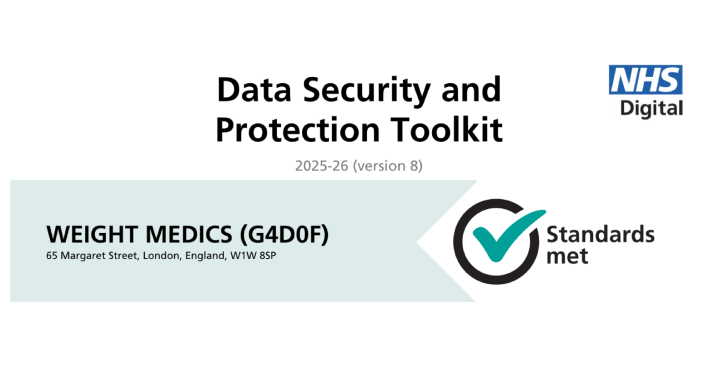
May marks Mental Health Awareness Month — a crucial time to shine a light on the many factors that impact our emotional and psychological wellbeing. At Weight Medics, we believe that understanding the link between nutrition and mental health is essential to achieving holistic wellbeing. Emerging research shows that what we eat doesn't just affect our waistlines — it also profoundly impacts our brain, mood, and overall mental health.
In this blog, we explore how diet influences mental wellbeing and offer practical tips on using food to support both body and mind.
The Gut-Brain Connection: More Than a Feeling
You’ve probably heard the phrase “gut feeling” — and it turns out, there's science behind it. The gut is often referred to as the “second brain” because it contains millions of neurons and produces 95% of the body’s serotonin, a key neurotransmitter involved in mood regulation.
When your gut microbiome — the community of bacteria in your digestive tract — is imbalanced, it can lead to inflammation, reduced serotonin production, and even symptoms of anxiety and depression. Diets rich in fiber, prebiotics, and fermented foods (like kefir, sauerkraut, and yogurt) help nurture healthy gut bacteria and, in turn, support mental wellbeing.
At Weight Medics, we incorporate gut health education into our personalised weight loss programmes, because true transformation is about more than just the scale — it’s about feeling better from the inside out.
Blood Sugar and Mood Swings: The Role of Balanced Nutrition
Ever felt irritable, tired, or anxious after a sugar crash? Blood sugar spikes and crashes from highly processed or sugary foods can have a real impact on mood and energy levels. A balanced diet that includes protein, complex carbohydrates, and healthy fats helps stabilize blood sugar levels and sustain mental focus throughout the day.
By reducing processed foods and increasing whole-food sources, like leafy greens, lean proteins, and omega-3 rich fish (such as salmon and mackerel), you're not just supporting weight loss — you're also promoting emotional stability.
Nutrients That Nourish the Mind
Certain foods and nutrients are known to support mental health. Incorporating them into your diet can be a game-changer, especially for those navigating stress, anxiety, or low mood.
- Omega-3 fatty acids (found in oily fish, walnuts, and flaxseeds): Essential for brain function and reducing
- inflammation linked to depression.
- Antioxidants (from berries, leafy greens, and dark chocolate): Help combat oxidative stress in the brain.
- B vitamins (especially B6, B9, and B12): Support neurotransmitter production and have been shown to reduce symptoms of depression.
- Fermented foods (like kefir, kimchi, and yogurt): Promote a healthy gut microbiome, improving mood and cognition.
- A Mediterranean-style diet — rich in whole foods, lean protein, healthy fats, and fibre — has consistently been linked with better mental health outcomes (Lassale et al., 2019).
Diet, Weight, and Mental Health: A Two-Way Street
There’s a complex relationship between body weight and mental health. While weight challenges can lead to lowered self-esteem and increased risk of depression, restrictive dieting or body image issues can also negatively affect mental wellbeing.
At Weight Medics, we offer medically supported weight loss solutions like Phentermine, Wegovy, and Mounjaro. These treatments are most effective when combined with nutrition counselling and mental health support. We believe in empowering our clients with realistic, compassionate, and science-backed strategies.
Diet for Mental Health: Practical Tips
Here are a few evidence-based ways to eat for better mental wellbeing:
- Eat the rainbow: Variety in fruits and vegetables boosts gut health and nutrient diversity.
- Add healthy fats: Include avocados, nuts, seeds, and oily fish in your meals.
- Focus on whole foods: Avoid ultra-processed snacks that spike blood sugar.
- Stay hydrated: Dehydration can worsen fatigue and brain fog.
- Keep regular mealtimes: Stabilising energy helps maintain mental clarity.
Final Thoughts: Nourish Your Body, Empower Your Mind
This Mental Health Awareness Month, take a moment to reflect on how your food choices affect not just your physical body, but your mental health too. At Weight Medics, we’re committed to helping you achieve a healthy lifestyle that supports emotional wellbeing through expert-led, compassionate care.
If you're struggling with mood, motivation, or weight-related concerns, reach out to our team. Together, we can build a personalised plan that supports every aspect of your health.
Ready to take the next step toward better mental and physical health? Contact Weight Medics today to book a consultation.
How does diet influence weight loss results?
Diet cuts calories and energy, helping you lose weight. A balanced, nutrient-dense diet maintains muscle mass, satiety, and calorie deficit to burn fat.
Can certain foods boost metabolism?
Balanced calories affect metabolism more than some foods. High-protein diets burn calories and help digestion and absorption by increasing thermic activity. Fibre-rich meals require more energy to digest. Strength training increases metabolism and lean muscle.
Does meal timing affect fat loss?
Balanced caloric intake is more important than when you eat. Eating at regular intervals and in accordance with your body's circadian rhythm (i.e., avoiding late-night eating and taking more calories in the morning) can help in the regulation of hunger hormones and metabolic functions.
How does gut health impact weight management?
Hormonal, inflammatory, metabolic, and digestive variables affect weight. Good gut microbiome bacteria and microorganisms digest food, generate chemicals, and link metabolic and hunger circuits. High-fibre, prebiotic, and probiotic diets improve gut flora, whereas ultra-processed foods and sugar destroy it.
Can emotional eating affect long-term weight loss success?
Emotional eating slows weight loss. Stress, sadness, boredom, and other factors can promote the consumption of high-calorie, low-nutrient foods. This can impede weight loss.
References
Clarke, G., et al. (2013). The microbiome–gut–brain axis during early life regulates the hippocampal serotonergic system in a sex-dependent manner. Molecular Psychiatry, 18(6), 666–673.
Lassale, C., et al. (2019). Healthy dietary indices and risk of depressive outcomes: a systematic review and meta-analysis of observational studies. Molecular Psychiatry, 24(7), 965–986.
Jacka, F. N., et al. (2010). Association of Western and traditional diets with depression and anxiety in women. American Journal of Psychiatry, 167(3), 305–311.
Firth J, et al (2020) Food and mood: how do diet and nutrition affect mental wellbeing? BMJ ,369: m2382.
Grajek M, et al (2022). Nutrition and mental health: A review of current knowledge about the impact of diet on mental health. Front Nutr. Aug 22;9:943998.








